College of Science, Engineering & Technology
Significantly transformed, and continuing its transformational drive
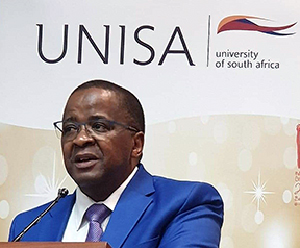
Prof Bhekie Mamba, Executive Dean: College of Science, Engineering and Technology
Tuesday, 2 June 2020, was a seminal day for transformation in the calendar of the College of Science, Engineering and Technology (CSET), which hosted a virtual workshop in which the Department of Leadership and Transformation presented and led discussions on the Unisa transformation programme.
Outlining the purpose of the workshop, Prof Zodwa Motsa Madikane, the Executive Director of Leadership and Transformation in the Office of the Vice-Chancellor, explained that the workshop was primarily about having a conversation on transformation with the college, specifically sharing ways in which this project could be implemented, monitored and reported on. After the workshop, it was hoped that the college would be better poised to interrogate its progress in transforming within the broader context of the institution and the country, she explained. Madikane emphasised the urgency for the university at large to continue its programme of transforming into the true African university which has rid itself of racism, tribalism, xenophobia, patriarchy and linguistic inequalities, and one that is accessible to all as a university of choice.
Embracing transformation_
In his official opening statement, Prof Bhekie Mamba, Executive Dean of CSET, made it clear that the impulse to transform was not a suggestion, but an obligation. Mandatory transformation is a concept that everyone should embrace, be they colleagues, staff, students or stakeholders of the university. The same applies to the country at large. The ED indicated that, when interrogating the scope of transformation, a number of pertinent questions arise:
- What are we transforming? Our employment equity (EE) profile needs to change, but we also need to look at upskilling our staff so that we consider not just numbers but also seniority. We need to consider what we teach and how. We need to transform how we relate to our community, and how we approach community engagement. We need to consider our stakeholders and industry, and our national and international stature. We need to produce graduates who can be employable or who can be entrepreneurs. We need to collaborate with strong partners who will not change our trajectories but will add value to our existing plans. As we transform, so our culture also needs to change. CSET, according to Mamba, has embarked on a project called CSET Collegiality, which ensures that the college brings about change across various fields and works together as a team.
- Why are we transforming? As a college, CSET cannot remain stagnant while the social, political and economic landscapes are changing rapidly. The country comes from an unfortunate past of inequality and we need to level the playing field. In Mamba’s view, working towards EE is crucial, but it is just as important to have properly skilled staff. In a scarce skills field such as science and engineering, we have many challenges, shared by all universities, but much has been achieved at CSET.
- How do we achieve transformation? Mamba advised that we need to be open-minded and resourceful, and consider our unique context. We need to grow our own timber, while mentoring upcoming talent and being willing to try out new initiatives. We also need to reflect honestly on whether these initiatives are working, or perhaps require tweaking.
The ED further posited that, for Unisa to move forward, it is crucial for the university’s policies to transform and complement what is already being done, to bring about transformation. For example, newly appointed lecturing staff at Unisa currently do not sign a contract that makes it mandatory for them to register for a higher qualification. He proposed that someone should not be appointed as a junior lecturer without a time frame being put in place for him or her to obtain a higher qualification and, ultimately, a PhD. This is one way of transforming the higher ranks of academia, but at present there is no stimulus to push staff to obtain higher degrees. Mamba added, with a measure of pride, that the CSET of eight years ago had significantly transformed, and is continuing its transformational drive across various disciplines.
Transforming CSET
The presentation by Dr Grace Kanakana-Katumba, the Deputy Executive Dean of CSET, revealed that the college has transformed and continues to do so, judging from the evidence presented below, which lists just some of the achievements:
Staff and student equity and development:
- The college boasts a total of 48 NRF-rated researchers (20% female and 80% male; of whom 48% are African, 15% Indian, 2% coloured, and 35% white).
- Six academics are currently participating in the Academic Qualification Improvement Programme (AQIP) (four of them are female, five are African). As history shows, all of the previous candidates obtained their degrees.
- The grow-your-own-timber (GYOT) and nGap programmes are being used to identify and nurture talent by specifically targeting young African candidates. In CSET there are currently 21 GYOT candidates (100% South African Africans, 62% female, 48% master’s & 52% PhD, all of whom are full-time on campus).
- CSET’s staff profile has shown a major trend towards true transformation in recent years. In total, 75% of CSET staff are South Africans or permanent residents who have lived in this country for more than 20 years.
- IDEAS (Institute for the Development of Energy for African Sustainability) and NanoWS (Nanotechnology & Water Sustainability Research Unit) find solutions to African problems.
- The college has established minimum teaching and learning standards, the Scholarship of Teaching and Learning research flagship, and plans a Centre of Innovation in Teaching and Learning that will guide transformation in teaching and learning.
- Language transformation: Translation of examination question papers and Statistics study guides into African languages, development of glossaries.
- Honours projects in Statistics focus specifically on problems in African contexts.
- New programmes are being introduced, such as a Bachelor’s degree in African Computing.
- The college provides access to undergraduate and postgraduate programmes via RPL processes.
- Infusion of curriculum transformation drivers in module re/development:
- The more than 140 modules submitted to the Directorate of Curriculum Development and Transformation (DCDT) integrate various technologies, open educational resources (OERs) and massive open online courses (MOOCs). They apply continuous assessment; and incorporate the principles of the United Nations Global Compact (UNGC) and diverse open distance electronic learning pedagogies.
- The integration of community engagement in teaching and learning has enabled curriculum transformation across 16 CSET modules.
Research:
- IDEAS (Institute for the Development of Energy for African Sustainability) and NanoWS (Nanotechnology & Water Sustainability Research Unit) find solutions to African problems.
Teaching and learning framework:
- The college has established minimum teaching and learning standards, the Scholarship of Teaching and Learning research flagship, and plans a Centre of Innovation in Teaching and Learning that will guide transformation in teaching and learning.
- Language transformation: Translation of examination question papers and Statistics study guides into African languages, development of glossaries.
- Honours projects in Statistics focus specifically on problems in African contexts.
- New programmes are being introduced, such as a Bachelor’s degree in African Computing.
- The college provides access to undergraduate and postgraduate programmes via RPL processes.
- Infusion of curriculum transformation drivers in module re/development:
- The more than 140 modules submitted to the Directorate of Curriculum Development and Transformation (DCDT) integrate various technologies, open educational resources (OERs) and massive open online courses (MOOCs). They apply continuous assessment; and incorporate the principles of the United Nations Global Compact (UNGC) and diverse open distance electronic learning pedagogies.
- The integration of community engagement in teaching and learning has enabled curriculum transformation across 16 CSET modules.
Kanakana-Katumba also discussed the difficulties the college experiences in terms of diversity, considering that science, engineering and technology is a scarce skills environment. In certain disciplines there are very few qualified South Africans available, especially at senior level, so the college uses different mechanisms to ensure capacity is grown in those fields
Learning languages
Madikane said that it was heart-warming to see that CSET had already done much work in transformation. She sensitised colleagues on the issue of language, which, she explained, had the potential of gravely marginalising others and becoming a major stumbling block to learning, especially in higher education. She stressed the need to dismiss the myth that indigenous languages could not accurately express concepts in the curriculum. "Language, as a major carrier of identity and culture, was one of the key instruments used in the colonial onslaught on Africa. Because it carries and broadcasts a people’s knowledge, it was used to advance western ideals while Africa’s own were suppressed through that same western education. We should never lose sight of the fact that one’s mother tongue is often best suited to convey the knowledge and sciences of his/her community."
Rethinking and changing
Dr Malekutu Bopape, Director of Institutional Culture, who also chaired the workshop, discussed institutional culture, diversity and social inclusion. He submitted that the college needed to acknowledge and embrace diversity and adopt a social inclusion ideology as a tool with which to order to change the institutional culture.
Speaking on transforming systems, policy and practice, Console Tleane, also from the Department of Leadership and Transformation, posed the question: "How do we teach and research in such a manner that it becomes a tool of liberation and development?" He emphasised that systems and policies are located within five pillars of transformation:
- Transforming epistemology, knowledge and scholarship
- Changing institutional culture
- Rethinking systems and policies
- Rethinking governance, leadership and management
- Promoting a discourse of change
In addressing EE-related issues, Masentle Lengane, Deputy Director of Employment Equity, reminded staff: "It is important for all colleges to strive towards assisting the Principal and Vice-Chancellor, Professor Mandla Makhanya, to adhere to the equity prescripts given by the Department of Labour."
Clarifying transformation
Keenly participating in the conversation, several CSET executive members also shared their views and experiences on matters such as such as a need for the college transformation efforts and progress to be visible for all to see, the language of teaching science, commercialisation and the speed in terms of knowledge production. In particular, the emphasis was on the need for the university to be clear on what it is transforming and how it should be done, rather than merely "ticking the boxes". The need for flexible HR practices that take into account the unique nature of a college such as CSET was also discussed, as in some fields the college competes for the small pool of qualified South African candidates with other government organisations, in addition to industry and other universities.
Transforming knowledge
Speaking on transforming knowledge, Prof Sabelo Ndlovu-Gatsheni, Director of Scholarship Change, explained that the subject of transformation is not only debated at Unisa or across South Africa, but it is, in fact, a subject of debate that has challenged the global landscape. This matter seems to be stemming from the epistemic crisis that exists in the world today. "We need to clearly see ourselves producing people who are able to do things for themselves, instead of [people who are] continuing to look for employment," he advised. He further indicated that discourse on transformation is largely viewed as a long-standing debate, which has still not been resolved. Ndlovu-Gatsheni also expressed a concern that many institutions in post-1994 South Africa had declared themselves "African" universities, without necessarily transforming their offerings, character or identity. In his view, there is a difference between a university in Africa and an African university.
Making solutions a reality
The meeting ended on a high note, with members of CSET management expressing their appreciation for the workshop, and Madikane acknowledged the numerous and diverse ideas that were shared in the workshop. She particularly urged the college to continue to strengthen its links with basic education in order that the development of scientists in the country and the continent could be nurtured long before students came to the university for their degrees.
"The workshop was insightful and packaged very well. The discussions and inputs confirmed that CSET is on the right track as far as transformation is concerned and, in fact, has done far better than would have been expected of a college in a scarce-skills environment. CSET will continue to not only find solutions, but will also make these solutions a reality, as shown by the transformative leadership being displayed during the online examinations," concluded Mamba.
* By Thembeka Ntuli-Mpapama, Communication and Marketing Specialist, College of Science, Engineering, and Technology
Publish date: 2020-06-22 00:00:00.0


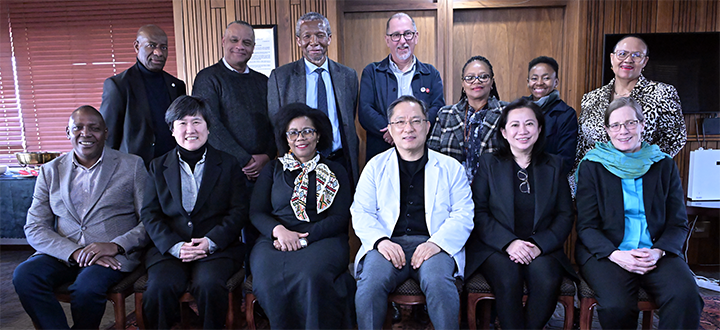 Unisa wins bid to host IAMS General Assembly
Unisa wins bid to host IAMS General Assembly
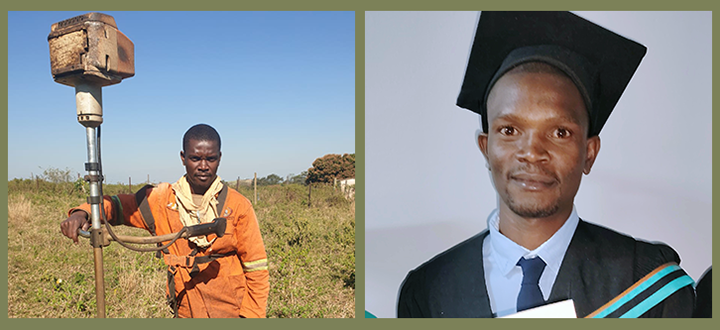 Cutting grass by day, pursuing Unisa studies by night
Cutting grass by day, pursuing Unisa studies by night
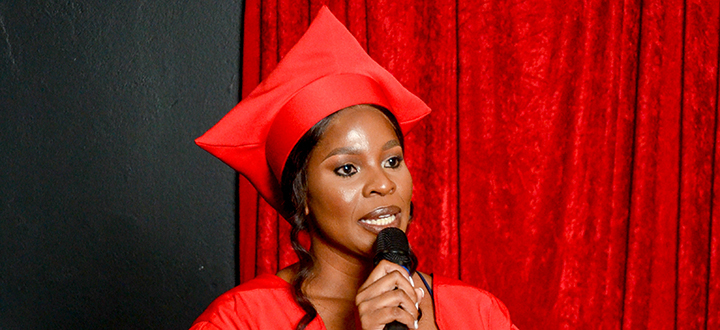 Unisan’s research set to improve accident records management through AI
Unisan’s research set to improve accident records management through AI
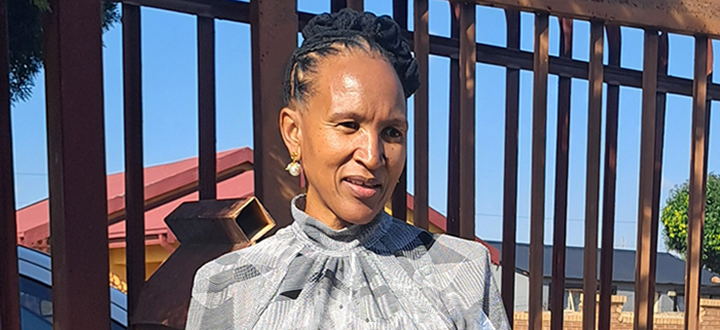 Koma e wetse: When tradition meets the harsh realities of modern livelihoods
Koma e wetse: When tradition meets the harsh realities of modern livelihoods
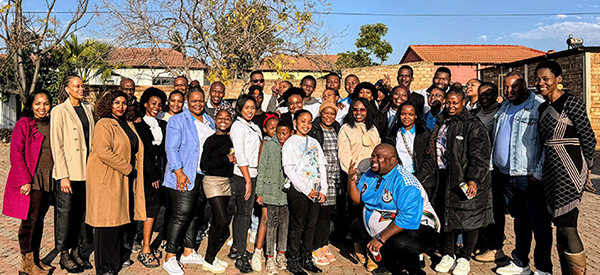 Imbizo inspires youth
Imbizo inspires youth